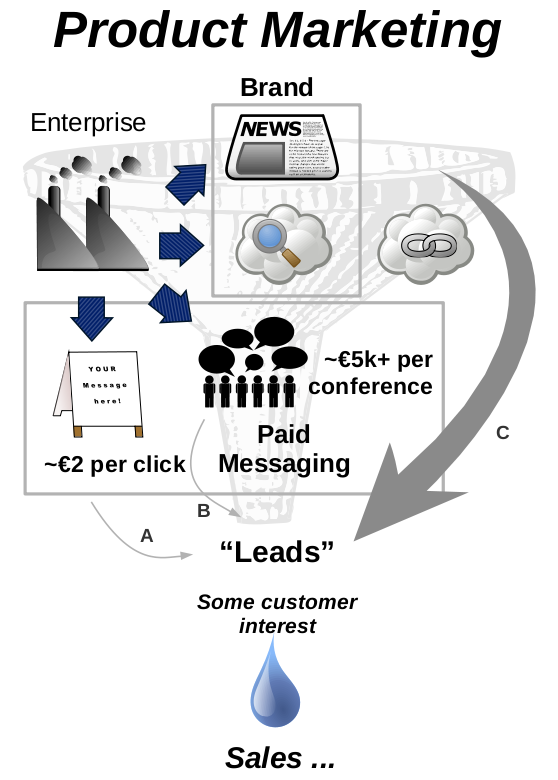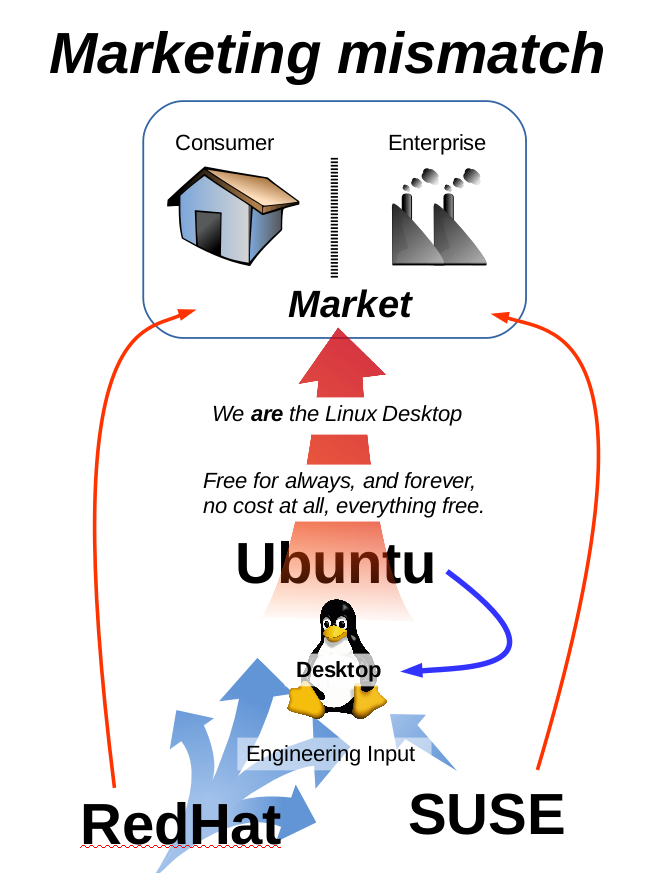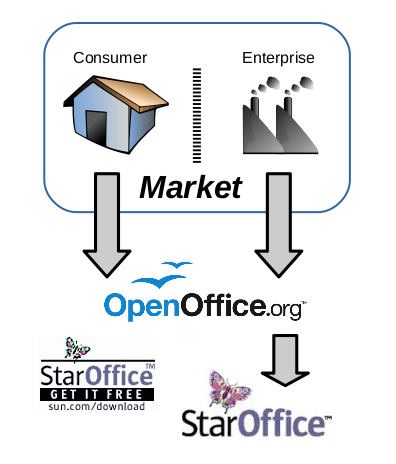This continues a series of items on Vendor Neutral FLOSS projects and how they do marketing which you can read here.
Marketing in the commercial world
In order for companies to sell products based on LibreOffice, it is vital that they find customers to whom they can sell (or that customers find them). Here is a picture of how the process of an enterprise customer finding a product might work:

People who have expressed an interest in your product are called leads - there are many ways in today’s world to get people to be aware of your products and register an interest (ie. to generate leads). Leads are the people that are focused on by the sales team to encourage them to enjoy the great results from using a LibreOffice based product. Here are some examples:
- You can buy per-click advertising in search engines and on web-pages. This is expensive, and the returns are typically less than the investment for low cost products in a mixed consumer & enterprise market. TDF itself has free advertising donated by Google which makes this possible for us.
- You can sponsor conferences, and attend them. Picking the right conference is a real trick, and the costs here are prohibitive. Imagine spending ~€5k attending a conference filled with Open Source interested Government IT decision makers. Imagine presenting your product, and having the friendly & enthusiastic conference moderator personally and explicitly promote buying your products to the entire conference. Imagine the zero leads that result in paid business, and/or any return at all. Repeat until convinced that this is a dead end. TDF itself has free booths at many conferences donated by the organizers, companies do not.
- Realize that news driving links and organic search for your brand – along with links from friendly projects, partners and products are the only cost-effective (ie. nearly free) way to get the volume of leads you need into the top of the sales funnel.
Clearly generating as many, relevant high quality leads to feed the sales pipeline is vital for any FLOSS business. If LibreOffice wants to build a successful ecosystem it needs to be deeply interested in the life-blood of sales: leads, how we can gently steer enterprises who visit us towards being interested in support and services, and encourage them towards companies who can serve them, and in doing so significantly improve LibreOffice ? Expecting companies to generate their own leads – particularly without having strong independent brands is extremely difficult, there are few, cost-effective pro-active marketing strategies available in today’s world for small companies.
Marketing & Framing in the FLOSS world
The Marketing / Investment mismatch problem
One of the particular pathologies of the FLOSS world is that where marketing and investment get out of step. This was particularly obvious around the Linux Desktop and contributed to the tragic commercial failure not only of individual desktop Linux distributions (remember Mandriva?), but also to the significant pruning of both SUSE, and ultimately RedHat’s desktop investment – before finally claiming much of Canonical’s desktop investment too.
Setting a price expectation in a market of zero (or below), forever and for everyone – is ultimately toxic to building a thriving commercial ecosystem. Therefore, ensuring that marketing and engineering investment are well aligned is in this area is something that TDF must be focused on. Those subsidizing marketing and a zero-price-point by getting others to do the engineering for them - tend to talk about their virtuous investment in growing the pie / market size for all; however driving an unhelpful price expectation for enterprises in an un-sustainable way is ultimately self-defeating.
It is vitally important that returns are correlated with investments – ie. if one company invests heavily, that its return is reasonably correlated with its investment vs. non-investors, otherwise – the tragedy of the commons yields a set of passive parties eagerly waiting for the returns generated by others’ engineering investment.
In individual projects this should be addressed through various qualitative and quantitative investment metrics, clearly presenting the realities of what has been contributed, while retaining a neutrality to vendors and investors, and advertising our model to new entrants.

When TDF was founded we deliberately positioned LibreOffice as a product of TDF, which was the right choice at the time. However this strategy no longer serves the market in its current form or scale. There is a risk that TDF (via it’s donors’) investment in the product itself can be mis-portrayed, creating an analogous situation, where TDF presents itself (perhaps with the help of some volunteers) as the creators of LibreOffice – ignoring the formidable contributions of Sun/Oracle, volunteers and present day corporate contributors.
Other projects: brand sharing open-source companies
An extremely popular model used to drive lead generation is visible in many open source projects which have single corporate stewards, for example Nextcloud, ownCloud, pydio, seafile and many many more. We are reasonably familiar with this approach from the OpenOffice days – and when done well – it can yield a flow of leads, and user interest in support and services around an open source project – but only to one company.

In this model – there are many advantages, not least from cheap or free conference attendance representing the (often identically named) open source project and widespread free advertising of your brand. The easy answer to the question “Why give all this away for free” is that every eyeball, every user will come to the owners, creators & authors to get support and services – by following the brand. This is why you see ‘Buy’, ‘Pricing’, ‘Enterprise Version’ and other such critical lead generating links prominently placed on brand sharing open source companies project pages.
TDF in contrast is a vendor-neutral project – and as such, directing all LibreOffice leads to a single company is neither desirable, nor sensible. We'll look in more detail at how TDF's marketing works in practice next time.
to be continued ...
To make this more digestible following sections will be serialized later, and built up into a reference-able whole here: https://people.gnome.org/~michael/data/vendor-neutral-marketing.html adding more flesh to the problem space
